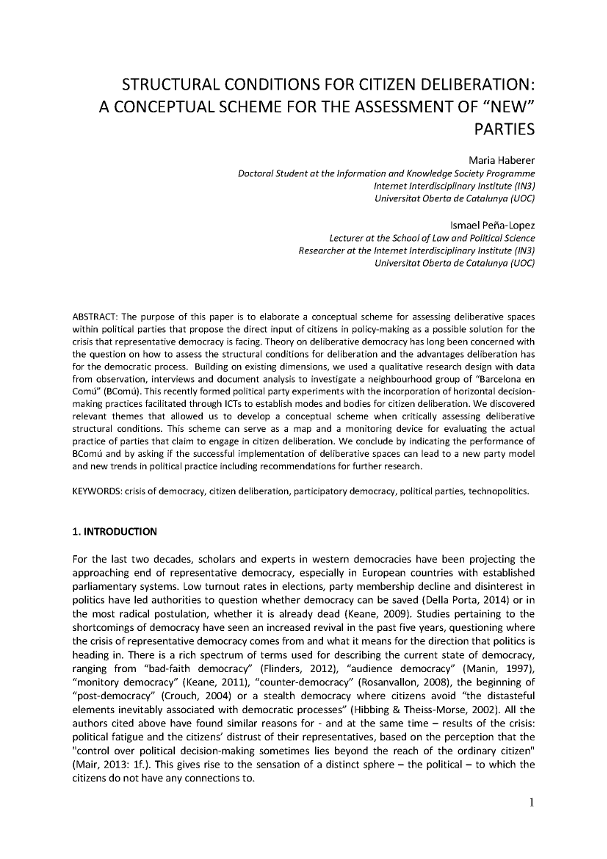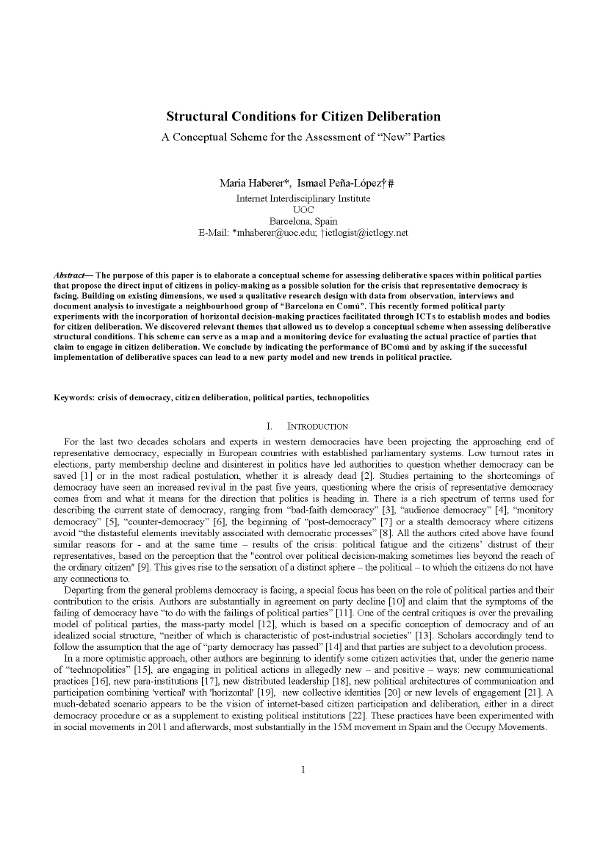By Ismael Peña-López (@ictlogist), 22 May 2016
Main categories: e-Government, e-Administration, Politics, News, Participation, Engagement, Use, Activism, Writings
Other tags: barcelona_en_comu, idp2016, maria_haberer, proceedings, technopolitics
No Comments »
Maria Haberer and I will be presenting our latest communication, Structural Conditions for Citizen Deliberation: A Conceptual Scheme for the Assessment of “New” Parties, also at IDP2016 – Internet, Law and Politics. Building a European digital space, organized by the School, Open University of Catalonia, and taking place in July 7-8 2016 in Barcelona (Spain).
Its content will be quite similar to what we presented at CeDEM2016 in Krems, Austria, though this version has been improved with the comments from the attendants of this conference and, of course, the reviewers of IDP2016.
A pre-print of the paper can be downloaded below. Note that some minor issues can differ from the final version to be published in the proceedings of the conference.
Abstract
The purpose of this paper is to elaborate a conceptual scheme for assessing deliberative spaces within political parties that propose the direct input of citizens in policy-making as a possible solution for the crisis that representative democracy is facing. Theory on deliberative democracy has long been concerned with the question on how to assess the structural conditions for deliberation and the advantages deliberation has for the democratic process. Building on existing dimensions, we used a qualitative research design with data from observation, interviews and document analysis to investigate a neighbourhood group of “Barcelona en Comú” (BComú). This recently formed political party experiments with the incorporation of horizontal decision-making practices facilitated through ICTs to establish modes and bodies for citizen deliberation. We discovered relevant themes that allowed us to develop a conceptual scheme when critically assessing deliberative structural conditions. This scheme can serve as a map and a monitoring device for evaluating the actual practice of parties that claim to engage in citizen deliberation. We conclude by indicating the performance of BComú and by asking if the successful implementation of deliberative spaces can lead to a new party model and new trends in political practice including recommendations for further research.
Dowloads
By Ismael Peña-López (@ictlogist), 21 May 2016
Main categories: e-Government, e-Administration, Politics, News, Participation, Engagement, Use, Activism, Writings
Other tags: barcelona_en_comu, cedem2016, maria_haberer, proceedings, technopolitics
No Comments »
Maria Haberer and I have presented a communication, Structural Conditions for Citizen Deliberation: A Conceptual Scheme for the Assessment of “New” Parties, at CeDEM2016 – International Conference for E-Democracy and Open Government 2016, organized by the Danube University Krems and that took place in May 18-20 2016 in Krems, Austria.
The research is a first approach to the phenomenon of the “network party” (or net-party) — though we are cautious about the naming and prefer so far a more neutral “new party” — and analyzes the case of Barcelona en Comú, the party now in office in the municipality of Barcelona and whose origin is deeply rooted in the 15M Spanish Indignados movement and other recent social movements with a strong technopolitical profile. The approach takes deliberation as the core around which all the organization spins while transitioning from a social movement to a (traditional?) political party.
Below can be found and downloaded the slides and full text of the communication.
Abstract
The purpose of this paper is to elaborate a conceptual scheme for assessing deliberative spaces within political parties that propose the direct input of citizens in policy-making as a possible solution for the crisis that representative democracy is facing. Building on existing dimensions, we used a qualitative research design with data from observation, interviews and document analysis to investigate a neighbourhood group of “Barcelona en Comú”. This recently formed political party experiments with the incorporation of horizontal decision-making practices facilitated through ICTs to establish modes and bodies for citizen deliberation. We discovered relevant themes that allowed us to develop a conceptual scheme when assessing deliberative structural conditions. This scheme can serve as a map and a monitoring device for evaluating the actual practice of parties that claim to engage in citizen deliberation. We conclude by indicating the performance of Barcelona en Comú and by asking if the successful implementation of deliberative spaces can lead to a new party model and new trends in political practice.
Slides
Dowloads
By Ismael Peña-López (@ictlogist), 20 July 2015
Main categories: e-Government, e-Administration, Politics, Meetings
Other tags: barcelona_en_comu, eduardo_santamarina, podemos, rosa_borge
No Comments »
From protest to political parties: online deliberation in the new parties arising in Spain
Rosa Borge, Eduardo Santamarina
What are the deliberative practices of the two most important parties (Podemos and Barcelona en Comú) that emerged from the 15M Indignados movement in Spain? What trade-offs entail the process of transformation from social movements into political parties? To what extent participation and deliberation could be realized at the same time?
Podemos and Barcelona en comú were founded in 2014. Three months after its foundation, Podemos won 5 seats at the European Parliament, and less than a year after its foundation Barcelona en Comú won the mayoralty of Barcelona.
Internal organization:
- Anyone can easily register online and participate in important decisions.
- Open particpiatory spaces at the base of the party: assemblies, high degree of independence, etc.
- Dominant position of the General Assembly or Plenary.
- Specific consultation or referendum for important decisions: electoral programme, agreements with other parties, etc.
- Participatory preparation of the electoral programme and organizational documents.
- Channelling for individual proposals (Plaza Podemos).
- Revocation of elected positions.
Developed a theoretical framework for measuring online deliberation, after Kies (2010) and Friess & Eilders (2014):
- Institutional or structural dimension: technical and structural design of the online platform in order to build a deliberative space: inclusion, asynchronous communication, content visibility, moderation, identification rules, division of labour, relevant information, horizontal interaction, etc.
- Communicative dimension: deliberative attitude of participants and how the communication process looks like, mainly with relation to the reaction of participants to each other’s ideas: discourse equality, reciprocity, justification, reflexivity, empathy, sincerity, plurality (inclusion).
- The outcome dimension: results or impact of the deliberation that could be individual or collective (external impact): tolerance, knowledge, efficacy, compromise, preference shift, consensus, legitimacy, impact on political decisions or public debates.
The research analysed the two most voted debates held in the online platform known as Plaza Podemos and the online process of developing the municipal electoral programme of Barcelona en Comú. The three levels (institutional, communicative, outcome) were examined through the deliberative criteria: analysis of the design of the platform and content analysis of the threads of the debates.
Plaza Podemos run on an installation of Reddit; while Barcelona en Comú used DemocracyOS for the deliberation, plus Agora Voting to prioritise and vote the final proposals.
Main conclusions:
- Both online processes were designed to be both participatory and deliberative spaces. This “procedural duality” seems to lean towards the voting side, becoming a kind of competitive space.
- Tensions between openness and closeness (a typical tension of a party).
- Extensive experimentation of new democratic processes: learning by doing.
- Inducement of a “participatory literacy” among citizens.
- These processes and the internal structure will be subjected to future changes.
The processes maybe were not optimal, but very much aiming at improving democratic processes.
Discussion
Q: are there facilitators in the platforms? What is their role? Rosa Borge: yes, there are facilitators, which usually do not appear on the front row, and whose role is mainly technical.
Q: how can you assure that you are fulfilling anyone’s expectations? Rosa Borge: we do not know by sure, but the overall sense of the community is of high satisfaction with both the platforms and the results.
Ivan Serrano: after this research, how do we characterize Podemos or Barcelona en Comú? Are they deliberative parties? Aren’t they? Were do they stand between the extreme of being a traditional party and a fully deliberative one? How can they compare one with each other? Rosa Borge: it is difficult to say after our research, as only a few debates were analysed. But, there is enough evidence to say that these parties look different from other more traditional ones. And yes, there is a tension between pure Habermasian deliberation (which aims at consensus) and the need to participate within the constraints of electoral times. Indeed, the idea of consensus is highly criticised by some authors, and that is why it was not included as an indicator for deliberation: there seems not to be that important that there is an agreement at the end of the process (and just vote instead).
Q: how long does it take to become a regular party? Rosa Borge: Everyone is quite surprised with the political success of both Podemos and Barcelona en Comú. What is true is that an initial lack of structures or political organization allows movements to move faster than traditional parties. After that, there is a tension between being operational and being more participative, and the tension is solved with a pendulum movement approaching each side until a balance is reached.
Marc Esteve: what about the tension between consensus and voting? Rosa Borge: lately, the priority is to have a decision or a position after the process of participation and/or deliberation. Thus why in most platforms everything can be voted on the go. Yes, it adds a sort of competition unnatural in a deliberative process, but it also allows to have “something” at the end of the process, and to make the process a finite one, one that won’t last forever.



